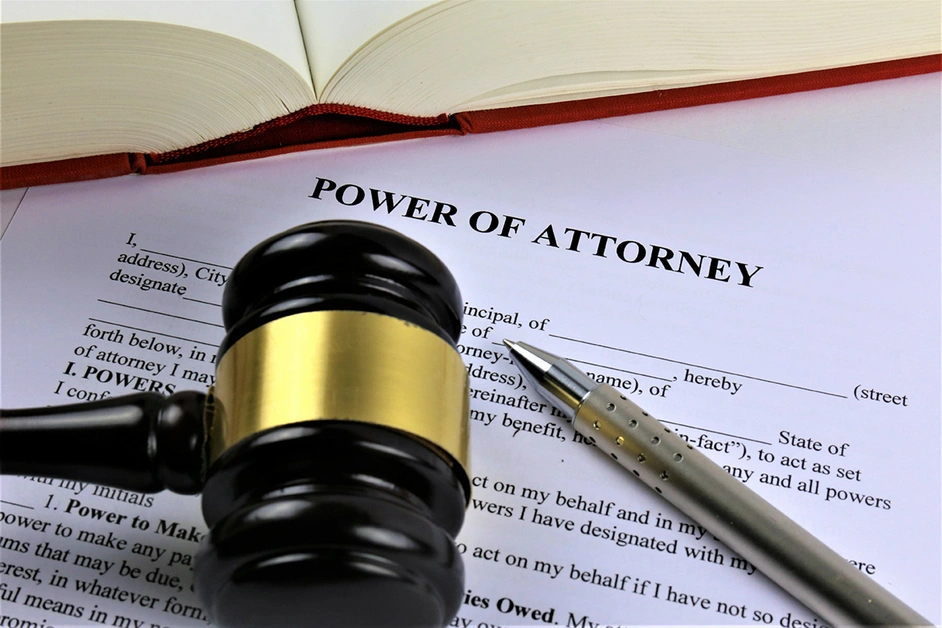What is Power Of Attorney and its Types?

Individuals must hand their properties and assets to the right person in the future. Here is what you need to know about Power of Attorney.
Nowadays, people are so busy in their chaotic lives that they need to take out some time from their busy schedules to plan their finances and plans. Individuals always think about their financial future, disregarding their well-being while investing. To take care of the personal well-being of an individual, the Power of Attorney format is undoubtedly the best choice.
The power to manage the legal and even some personal decisions for an individual (principal) is given to another individual (agent) through a legal document named 'Power of Attorney'. According to the principal's will, the agent can have the power to make broad or limited legal decision-making powers. When an individual is not present to sign their documents, the Power of Attorney is usually appointed. The individual must make it with care as it is a very crucial decision.
What are the Types of the Power of Attorney?
Durable Power of Attorney
An agent can immediately start acting on your behalf as soon as you sign a durable power of attorney (unless stated otherwise) in case you become incapacitated.
A durable power of attorney (DPOA) ends automatically once you die.
Non-Durable Power of Attorney
A non-durable power of attorney will expire if you get incapacitated or die.
General Power of Attorney
The broad authority to act on your behalf – making any financial, business, real estate, and legal decisions which were supposed to be your responsibility is given to the agent by a general power of attorney. For instance,
- Managing banking transactions
- Buying and selling property
- Paying bills
- Entering contracts
Once you are dead or incapacitated, a GPoV will expire (unless it is durable). You may only want to use this power of attorney for a short duration when you are physically or mentally unable to handle your affairs because it gives your agent a lot of extensive authority. For instance, while travelling outside the country, forex tended period.
The state statutes may restrict the powers granted under a general power of attorney. Depending on your selected type of POA, it is defined who can override your power of attorney.
Limited Power of Attorney
A limited (special) power of attorney (LPoV) allows an agent to act on your behalf, but only for specific purposes, which is different from general power of attorney. For instance, a limited power of attorney can authorize someone to cash checks on your behalf. In contrast, this person won't have the authority to access or control your finances fully.
This type of power of attorney will expire depending on what has been stated in the form or on the completion of the specific task. You can make numerous limited POAs for different agents — authorizing each person with different powers.
Springing Power of Attorney
If a specific event, medical condition (usually incapacitation), or the event specified in the POA occurs, a springing (or conditional) power of attorney goes into effect. It may end at a specific time, in case you become disabled or die. For instance, military personnel may draft the springing power of attorney, which will come into effect once deployed overseas.
Medical Power of Attorney
It comes under springing and durable POA. A medical power of attorney gives the authority of a healthcare agent to make medical decisions for you in a situation you cannot do so for yourself. Your agent will have the authority to make a broad range of healthcare decisions for you which includes:
- Medical treatment
- Healthcare facilities' choices
- Surgical procedures
- Medical records release
- Artificial hydration and nutrition
- Organ donation
Your agent will ensure that your healthcare providers give you the medical care specified in your Do Not Resuscitate (DNR Form) or Living Will.
After you have signed a medical power of attorney, it immediately becomes effective, although it cannot be used unless the physician(s) have declared you mentally incompetent.
Functionality in Terms of Power of Attorney
If you are not conscious enough to make your own decisions, then your family does not have an inherent right to take them on your behalf. Also, if your family does not have power of attorney, it would be a hectic procedure to be followed, which may hurt you and your family.
It goes without saying that if you do not appoint someone who can speak from their side and felicitate in their decision-making, POAs are helpful for you and your family and can act as a defensive wall.
While choosing a person you want to be your bellwether about making decisions should be made with the utmost care, they should be someone you can trust with all of your heart and who can never betray you.
How Can You Register for Power of Attorney?
When the original owner of the property can not act on their own, then a power of attorney is put into effect. The delegated jurisdiction encompasses finances, real estate, tax payments, and other legal methods, including other things.
The power of attorney act was enacted in 1882 and encapsulated its functionality within India. The agent becomes functional with all of the principal's powers if it is an extended POA. There is a possibility that an agent can have the power functional in several streams on behalf of the principal, which are:
- Every contract agreement, simple deed, bond, mortgage, note, cheque, draughts, and money order must be completed.
- Managerial, middle-ground decision-making, settlements, and adjustments concerning all real estate-related issues
- Leasing of property, collection of rental amounts, granting, negotiating, selling, or borrowing and mortgaging are all available options.
- Stocks, bonds, and other investment-related things should be sold off.
- The papers related to insurance, tax returns, and other documentation databases should be filed and signed.
- An agreement should be signed, executed, and delivered regarding any contract agreement, entering into contracts, and performing any contracts, deeds, or writing.
- Decisions should be made for the donor's or his minor child's medical treatment.
All of the functionality the agent can play up is given above, but it needs to be more encompassing regarding power of attorney. Considering the agent's demands, several distinct sets of energy can be put under utility for the respective property type.
Stamp Duty Charged for Power of Attorney
The stamp duty applied will be varied according to the various agents. If a family member pays the stamp duty, the amount charged will be 500 rupees while registering. In all other cases, the consideration to be paid for stamp duty is based on the market value of the property or assets.
In addition, a 100-rupee fee is to be paid by everyone as registration fees. The stamp duty varies as per the Power of Attorney.
Revocation of Power of Attorney
The Indian Contract Act (section 201) stipulates that a power of attorney is revoked if the principal delegates the authority to the agent. It can also happen when the agent repudiates the functionality of their agency. This section also exemplifies that if the agent or the principal dies or has become of unsound mind, it is also revoked.
When it comes to section 202 of the Indian contract act elucidates the instances when the revocation of the agency cannot be done, i.e., when an agent has a part or interest in the property, which forms the factors that need to be considered while discussing the agency. The agency does not hold the right to be continued without the explicit agreement of the principal.
Conclusion
The functionality of a power of attorney is such that it entitles the agent to execute the decision-making on all the relevant decisions from the principal's side. The authority given to that agent can vary, limited or absolute. When the principal cannot make conscious decisions, a POA becomes necessary.
Essentially, a POA is a documental database that delegates your decision-making authority to someone else appointed by you on the criterion that you can't make it on your own. Various types of POA exist, so it is best if you can figure out which one best suits your needs.









